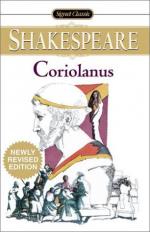|
This section contains 12,882 words (approx. 43 pages at 300 words per page) |

|
Burton Hatlen, University of Maine at Orono
Tonally, Coriolanus is Shakespeare's coolest tragedy. The protagonist does not invite audience identification—if anything, he spurns our sympathy. But the play treats his antagonists no less coolly. As a consequence, audiences and critics have often seen the play as working not so much upon our passions as upon our analytic faculties.1 But what questions does the play address? In our century, many critics have seen the play as turning on political issues. For some of these critics, the key issue is the struggle, whether in ancient Rome or in Jacobean England, between opposing social classes, noble and plebeian, or the relationship of the "great man" to the people, while other critics have argued that the play problematizes the very concept of the "political." But a second tradition of interpretation has built on psychoanalytic theory to explore Coriolanus' problematic relationship with...
|
This section contains 12,882 words (approx. 43 pages at 300 words per page) |

|


